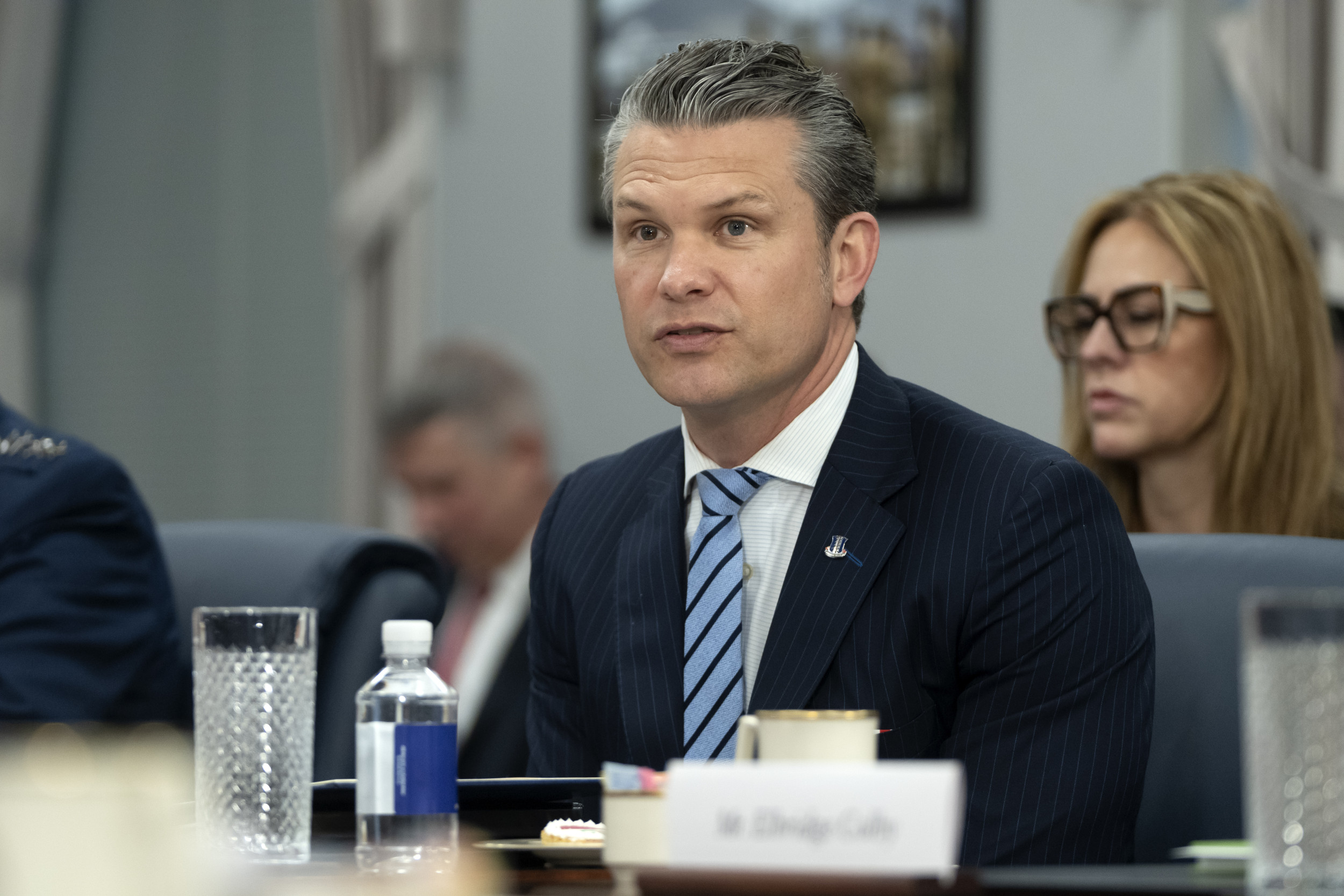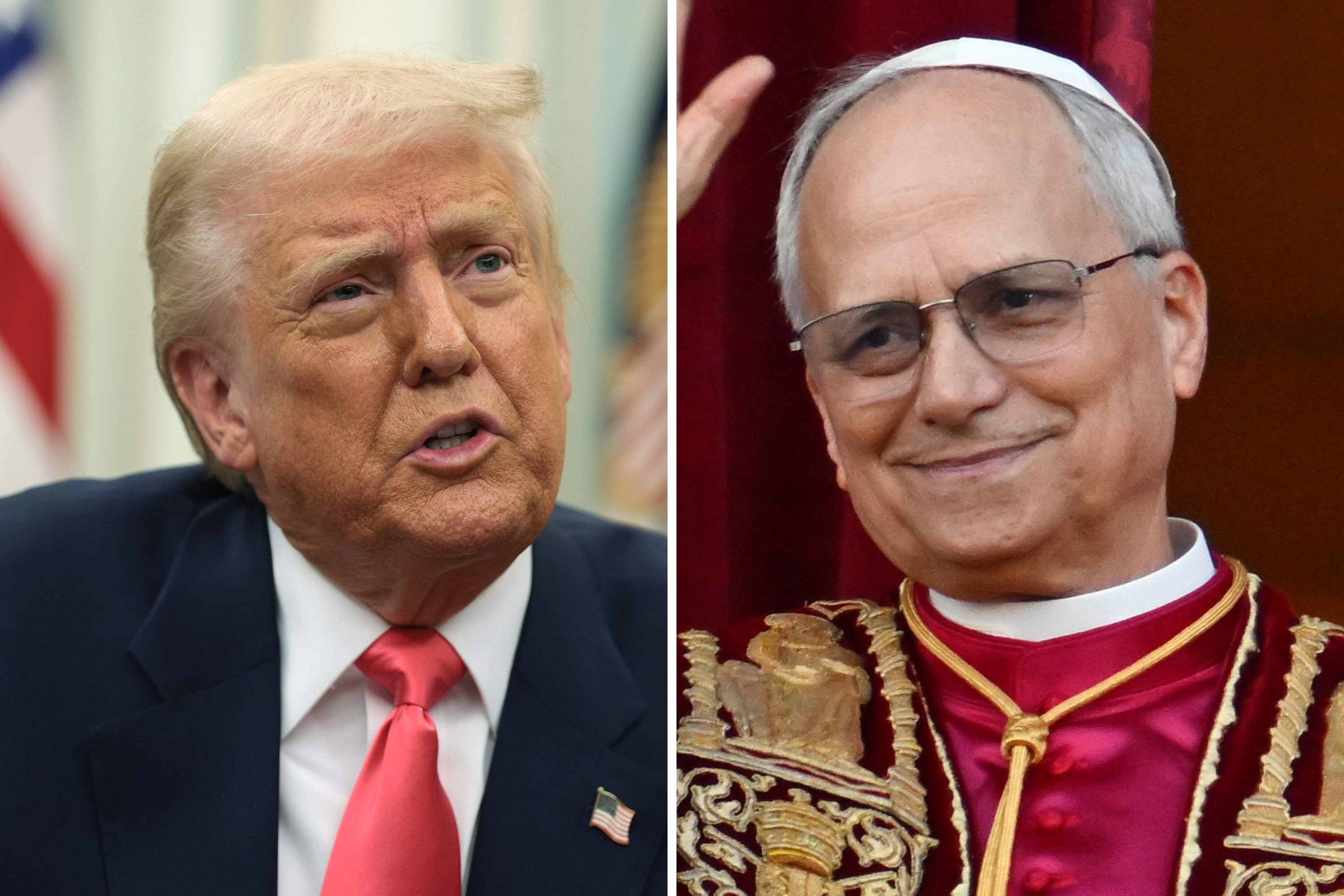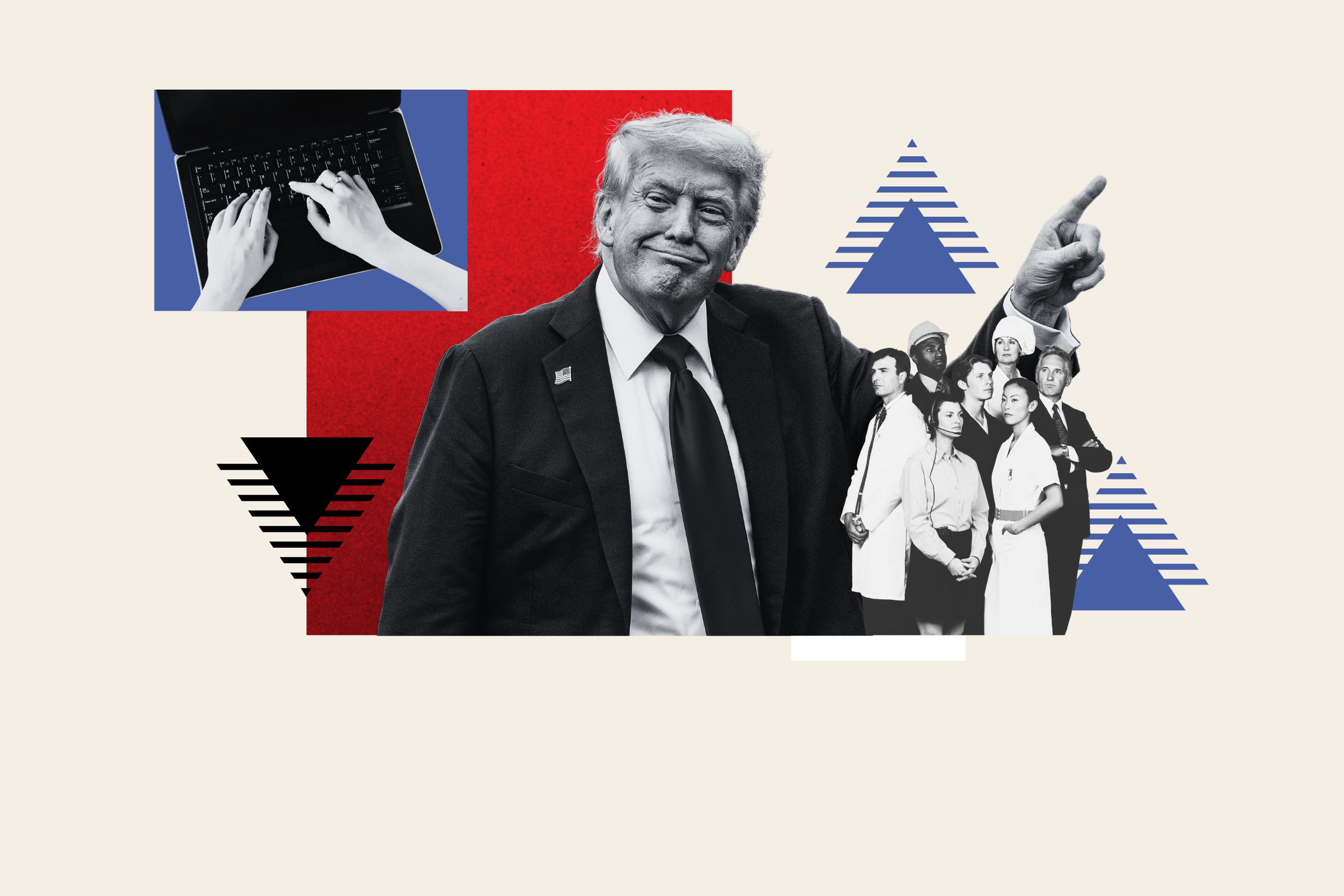🎙️ Voice is AI-generated. Inconsistencies may occur.
Todd Blanche, who represented Donald Trump during his 2024 criminal trial, has been appointed acting Librarian of Congress following Carla Hayden's recent firing. This change comes amid ongoing conservative criticism of Hayden's leadership. Blanche, a former federal prosecutor and defense attorney, now steps into the role after serving as Deputy Attorney General.
What to Know:
- Blanche replaces Carla Hayden, who was dismissed last week.
- Hayden, nominated by President Obama in 2015, faced backlash for promoting a "woke" agenda.
- In Trump's New York hush money trial, Blanche was instrumental in Trump's defense.
- The appointment signals a shift in leadership at the Library of Congress.
This live blog is now closed.
Stocks surge on Trump-China Tariff truce, bringing relief to 401(k) holders
Stocks surged Monday following the announcement of a 90-day truce in the trade war between China and the United States.
The S&P 500 climbed 3.3 percent in late-day trading, narrowing its gap to just 4.8 percent below its all-time high from February. The index, a cornerstone of many Americans' 401(k) retirement plans, has rebounded sharply after plunging nearly 20 percent last month.
The S&P is now above levels seen on April 2—dubbed Trump's "Liberation Day"—when sweeping global tariffs were first announced, sparking widespread fears of a self-inflicted economic downturn.
The Dow Jones Industrial Average leaped 1,100 points on Monday.
EEOC moves to fire judge who defied Trump administration gender policy
The U.S. Equal Employment Opportunity Commission has moved to terminate Administrative Judge Karen Ortiz, citing "profoundly unprofessional" conduct after she publicly criticized the agency's compliance with Trump's executive order defining gender as strictly male or female.
Ortiz, based in New York, was placed on administrative leave last week and given notice of the agency's intent to fire her. The action follows a February email she sent to more than 1,000 colleagues, condemning Acting Chair Andrea Lucas and accusing the EEOC of abandoning its commitment to protecting transgender workers. That message later leaked online and gained widespread attention.
The agency has since deprioritized all new cases involving gender identity discrimination and dropped several pending ones, a sharp shift from its previous stance.
Ortiz, who said she has no regrets, plans to fight the dismissal. She has already faced email restrictions and a written reprimand for her earlier messages but remains vocal in her opposition.
"This proposed action does not pertain to the content of your disagreement," EEOC officials wrote in the notice, "but rather the disrespectful and disparaging manner in which you have conveyed your message."
Episcopal Church ends refugee partnership over directive to resettle white South Africans
The Episcopal Church's refugee arm is cutting ties with the federal government after being directed to help resettle white South African refugees—a move church leaders say contradicts their commitment to racial justice.
Episcopal Migration Ministries, which has worked with the U.S. government for decades to resettle refugees, announced Monday that it will terminate its federal resettlement grants by the end of the fiscal year. The decision came shortly before 59 white South Africans arrived in Virginia on a chartered flight, following a fast-tracked refugee policy supported by President Donald Trump.
Presiding Bishop Sean Rowe said the church could not support what he called a "highly unusual" selection process that gave preferential treatment to one group over thousands of refugees who have been waiting for years.
"We are not able to take this step," Rowe said, citing the church's historic ties with the Anglican Church of Southern Africa and its anti-apartheid legacy.
Another group, Church World Service, said it is willing to help resettle the Afrikaner arrivals but criticized the administration for fast-tracking one group while restricting others.
The Episcopal Church says it will continue supporting immigrants and refugees through other efforts.
Rand Paul says Kentucky businesses uneasy with Trump's tariffs
Sen. Rand Paul said Monday that many Kentucky business leaders are worried about the impact of President Donald Trump's ongoing trade wars, which continue into his second term.
After meeting with Louisville business owners, Paul said nearly every industry represented — including farming, auto manufacturing, homebuilding, bourbon, and shipping — expressed concern over Trump's tariff policies.
"Virtually every business that I have met in Kentucky has said they're not excited about having tariffs," Paul told reporters.
The senator welcomed a 90-day tariff truce between the U.S. and China, saying he would praise Trump if a long-term deal leads to lower tariffs.
While Trump remains popular in deep-red Kentucky, Paul joins Sen. Mitch McConnell and Gov. Andy Beshear in voicing bipartisan concern over the economic fallout of aggressive tariff moves.
"Tariffs are taxes," Paul said, calling for Congress to reclaim authority over trade decisions.
DOJ officials turned away from Library of Congress after claiming new roles
According to three sources who spoke with NBC News, two Department of Justice officials from the Trump administration were denied access to Library of Congress offices Monday morning after claiming they had been appointed to top leadership roles.
Brian Nieves and Paul Perkins arrived at the U.S. Copyright Office claiming to be the acting deputy librarian and acting copyright registrar, respectively. They presented an email and a letter stating their appointments, including a claim that current Deputy Attorney General Todd Blanche was being installed as acting librarian of Congress. Staff and security at the library declined to let them in, and the two left without being escorted out.
The incident has raised legal questions, as the Library of Congress operates under the legislative branch and not the executive. While the president can nominate a librarian of Congress with Senate approval, the White House has no direct authority to assign interim leadership without congressional input.
An internal email from acting Librarian Robert Randolph Newlen acknowledged the confusion, telling staff the library had not yet received guidance from Congress on how to proceed. Congressional offices, the DOJ, and the White House have not commented.
Trump admits white South Africans as refugees, sparking backlash and denial from Pretoria
The Trump administration has admitted 49 white South Africans into the U.S. as refugees, claiming they face discrimination and violence at home—a claim the South African government strongly disputes. The group, which arrived Monday at Dulles International Airport on a private charter, was welcomed by senior U.S. officials, including Deputy Secretary of State Christopher Landau.
President Trump said the decision was driven by what he called "genocide" against white farmers in South Africa. Experts and South African officials rejected that characterization, saying it misrepresents the country's crime problem and ignores Afrikaners' economic privilege.
The move has drawn criticism from refugee advocates, especially as Trump previously suspended broader refugee resettlement efforts. South African President Cyril Ramaphosa said he told Trump the claims were based on misinformation and do not reflect reality.
Critics also questioned why this group was prioritized when others fleeing war and persecution remain in limbo. Faith-based groups like the Episcopal Church have refused to help with resettlement, citing concerns over racial equity.
House GOP plan includes $880B in Medicaid cuts to fund Trump tax breaks
House Republicans have released a sweeping bill that proposes $880 billion in cuts, mainly from Medicaid, to help offset the cost of extending Trump's 2017 tax breaks, which are set to expire at the end of the year. The legislation is part of Trump's "big, beautiful bill," and could become the most significant health care battle since the failed attempt to repeal the Affordable Care Act in 2017.
Republicans say the cuts target "waste, fraud, and abuse," but Democrats argue the proposal would cause millions to lose coverage. The Congressional Budget Office estimates that if the plan is enacted, 8.6 million fewer people would have health care over the next decade.
The bill includes new work requirements for Medicaid, more frequent eligibility checks, and out-of-pocket costs for some recipients. It also reduces federal funding for states that cover undocumented immigrants and includes provisions to roll back clean energy programs from the Biden administration.
With Memorial Day as the deadline, House Speaker Mike Johnson and GOP leaders are racing to hold hearings on the bill, though some Republicans have warned against slashing health care to pay for tax breaks.
How US tariffs on China have changed since Trump's first term

Monday's announcement of a temporary reduction in import tariffs is only the latest chapter in a nearly eight-year trade dispute that began during President Donald Trump's first term.
The agreement, which followed discussions between American and Chinese representatives in Geneva, was described by the White House as a demonstration of "Trump's unparalleled expertise in securing deals that benefit the American people."
Check out a full timeline on how tariffs on China have evolved in Hugh Cameron's story on Newsweek.
Trump and Pritzker reach deal to advance Great Lakes carp barrier
A $1.2 billion project to block invasive carp from reaching the Great Lakes is moving forward again after the Trump administration assured Illinois Gov. JB Pritzker it would cover the federal share of the costs.
The plan, which includes technologies like bubble curtains, electrical fields, and sound deterrents near Joliet, Illinois, had stalled when the Trump administration temporarily froze funding reviews earlier this year. Pritzker responded by halting land transfers critical to the project, demanding confirmation that federal support would continue.
That confirmation came Friday in a White House memo declaring the carp threat a priority and urging Illinois to proceed. Pritzker's office said he was satisfied with the assurances and would move ahead.
Originally proposed in 2020, the project at the Brandon Road Lock and Dam is designed to stop carp from entering Lake Michigan, where they could devastate the $7 billion Great Lakes fishing industry. Work is expected to continue through 2032.
Chamber of Commerce welcomes tariff pause, warns of ongoing strain
The U.S. Chamber of Commerce said it supports the newly announced pause on tariffs between the U.S. and China. However, it warned that "record high" import duties still pressure American companies, especially small businesses.
"While any agreement that reduces tariffs is good news," said John Murphy, a senior vice president at the Chamber, "it is important to note that even with this China agreement, tariffs are much higher overall than they were at the beginning of the year."
The Chamber also urged President Trump to reinstate tariff exclusions for small businesses, particularly for goods not manufactured in the U.S. or in cases where companies risk laying off American workers due to the financial burden of tariffs.
The White House has said that upcoming tax legislation may provide some relief for affected businesses.
Trump's DEI crackdown threatens women in construction programs
The Trump administration's push to eliminate diversity, equity, and inclusion (DEI) programs threatens vital community-based initiatives that help recruit women into the construction industry. Federal funding cuts, prompted by two executive orders targeting DEI initiatives, jeopardize critical programs supporting women entering trades. These include apprenticeship readiness, anti-harassment training, and child care services.
Construction industry leaders and nonprofits, such as Chicago Women in Trades, which help women access skilled trades, are facing uncertainty due to the funding cuts. These programs are essential in addressing labor shortages, with the industry needing over 400,000 workers this year alone.
While Trump has proposed shifting funding to local governments, advocates argue that halting support for DEI programs will stall progress toward gender and racial equality in the construction workforce. Legal battles are ongoing, with organizations like Chicago Women in Trades challenging the cuts, arguing they violate constitutional principles.
Trump signs executive order to lower prescription drug prices
President Donald Trump signed an executive order on Monday to reduce prescription drug prices in the U.S. The order sets a 30-day deadline for drugmakers to voluntarily lower prices or face new government limits. Health Secretary Robert F. Kennedy Jr. will lead negotiations with pharmaceutical companies to set new prices, which could be tied to lower costs in other countries.
Trump emphasized that Americans would pay the same prices as Europeans for drugs, aiming for a "most favored nation" approach. The order could impact the cost of drugs covered by Medicare and Medicaid, but its effect on those with private insurance is unclear. Drugmakers opposed the plan, arguing it could harm patients and disrupt research efforts.
This move follows Trump's previous attempts to lower drug prices, which faced challenges during his first term. Although no immediate savings are expected, the administration hopes to see progress in the coming months.
Trump administration's DEI policy cuts threaten efforts to recruit women into construction
The Trump administration's push to dismantle diversity, equity, and inclusion (DEI) programs is putting at risk the significant progress made in recruiting women into construction, a sector facing severe labor shortages. Federal funding cuts to community groups that support apprenticeship programs for women, including those focused on anti-harassment training and transportation assistance, have created uncertainty for organizations like Chicago Women in Trades.
While the construction industry has made strides in diversifying its workforce, women still make up only 4% of skilled trade workers. These DEI-focused programs have been crucial in attracting women and minorities to well-paying, skilled jobs. However, the Trump administration's executive orders, which target federal funding for DEI programs, have caused a wave of uncertainty for nonprofit organizations that provide essential services to underrepresented groups.
Several community organizations, including Chicago Women in Trades, are considering legal action to challenge these cuts, arguing that they are detrimental to the workforce and the communities they serve. Industry leaders emphasize that attracting women into construction is necessary to address the growing demand for workers, with trade groups citing the need for hundreds of thousands of new hires in the coming years.
While some groups, like Turner Construction, continue to support these diversity initiatives, others fear that the removal of federal funding could stall essential programs, undermining efforts to build a more inclusive industry.
Homeland Security ends temporary protected status for Afghans
Homeland Security Secretary Kristi Noem announced the end of temporary protected status (TPS) for Afghan refugees, stating that conditions in Afghanistan no longer meet the statutory requirements for the designation.
The Biden administration granted TPS after the Taliban took over Afghanistan, allowing refugees to remain temporarily in the U.S. Noem cited improvements in security and a stabilizing economy in Afghanistan as key factors in the decision. TPS for Afghans will expire on May 20, with termination set for July 12.
Pete Hegseth's cowboy statue gift held for breaking rules

A gift that U.S. Secretary of Defense Pete Hegseth sent to his British counterpart, John Healey, was held by British officials because of the U.K. ministerial gifts rules.
Hegseth sent Healey, the U.K. minister of defense, a cowboy statue and a photograph in March, but the U.K. defense department retained it.
Hegseth's gift came as he met Healey in the Pentagon on March 6. The pair previously convened in Brussels in February ahead of a Ukraine Defense Contact Group meeting at NATO headquarters.
The relationship between the U.S. and the U.K. is seen as of utmost importance and officials frequently meet to negotiate common interests and share policy ideas.
Deputy Attorney General Todd Blanche appointed acting Librarian of Congress
Todd Blanche, the former Deputy Attorney General who represented Donald Trump during his 2024 criminal trial, has been appointed the acting Librarian of Congress, the Justice Department announced Monday.
Blanche takes over from Carla Hayden, who was fired last week amid criticism from conservative groups over her perceived "woke" agenda. Hayden, nominated by former President Barack Obama in 2015, had served as Librarian of Congress for several years.
Blanche, a former federal prosecutor, was appointed as the Justice Department's number two official before his new role. He played a key role in defending Trump during multiple legal challenges, including the New York hush money case, which ended in a conviction on 34 felony counts.
Trump signs order giving drugmakers 30 days to lower prices or face limits
On Monday, Trump signed a wide-reaching executive order that gives pharmaceutical companies 30 days to lower prescription drug prices or face new government-imposed payment limits.
The order directs the Department of Health and Human Services to negotiate lower prices directly with drugmakers. If those talks fail, a new rule would cap the U.S.'s payment for medications based on lower prices paid by other countries.
Federal health officials are expected to begin meeting with drug companies immediately to push for price cuts. While the administration says the move aims to make medications more affordable for Americans, pharmaceutical companies warn that cuts to profits could hurt future drug innovation.
American-Israeli hostage freed in Gaza amid possible ceasefire talks
Hamas has released Edan Alexander, an American-Israeli soldier held hostage for more than 19 months in Gaza, in what the group called a goodwill gesture toward the Trump administration. His release comes ahead of expected talks between Israel and Hamas that could lead to a new ceasefire.
Alexander, captured during Hamas' Oct. 7, 2023, cross-border attack, was transferred Monday, according to an Israeli official. His release is the first since Israel resumed strikes in March, ending an earlier ceasefire. Israeli Prime Minister Benjamin Netanyahu confirmed no concessions were made, though a safe corridor was provided.
President Trump, due in the region this week, called the move a "step taken in good faith" and said he hoped it would lead to the end of the war and the return of all remaining hostages. Netanyahu sent negotiators to Doha for renewed talks, while Israel maintains plans to intensify its military campaign.
Critics of Netanyahu argue he has failed to bring home the remaining 58 hostages, including at least 24 believed to be alive. More than 52,800 Palestinians have been killed in the war, according to Gaza's Health Ministry.
Trump floats Turkey detour for Ukraine-Russia talks during Mideast trip
Trump said Monday he may alter his upcoming Middle East trip to stop in Turkey. There, peace talks between Russian President Vladimir Putin and Ukrainian President Volodymyr Zelenskyy are expected to take place on Thursday.
Speaking to reporters, Trump said he's optimistic about the planned Istanbul meeting and is considering attending if his presence could help move negotiations forward.
"I was thinking about flying over," Trump said. "I don't know where I am going be on Thursday... There's a possibility there I guess if I think things can happen."
Trump, who will be in Qatar and the United Arab Emirates this week, praised Turkish President Recep Tayyip Erdoğan as a "great host" and said Thursday's talks could be promising.
Officials weigh in on U.S.-China trade deal and protest arrest in CNN interviews
On CNN News Central Monday, top officials addressed economic and political developments. National Economic Council Director Kevin Hassett praised the new U.S.-China trade agreement, calling it "a very historic fresh start." Meanwhile, Newark Mayor Ras Baraka defended himself following his arrest at a protest outside a New Jersey ICE facility, calling federal claims of violence "a complete fabrication." Rep. Jake Auchincloss (D-MA) also joined the program, criticizing President Trump's approach to tariffs.
Hassett described the agreement as a breakthrough, highlighting President Trump's pressure tactics and reciprocal tariffs as catalysts for progress. "Imagine we're selling beef in the U.K. again," he said, noting that China has agreed to lower its own tariffs as part of the deal.
Mayor Baraka pushed back strongly against the Department of Homeland Security's claims that protesters acted aggressively. "No one stormed anything," he said, describing the arrests—including his own—as unwarranted and politically motivated.
Rep. Auchincloss offered a more skeptical take on the trade negotiations. "You've got to give credit to Trump as a marketer," he said, accusing the president of creating uncertainty only to take credit for partially resolving it. "All this does is extend uncertainty for another 90 days."
Green card holder held by ICE for two months: 'Thought that we were safe'
A green card holder spent nearly two months in detention on deportation proceedings, after getting stopped by federal authorities over a previous misdemeanor charge as he returned from vacation with his family.
Newsweek reached out to U.S. Customs and Border Protection for comment.
President Donald Trump vowed to remove millions of undocumented immigrants as part of a hardline mass deportation policy. However, concerns have been raised as dozens of cases have emerged of green card holders getting caught in the immigration raids.
On January 9, Kunal Oberoi, 37, arrived at Detroit Metro Airport with his wife and children after a trip to visit relatives in India. An ICE agent stopped him and questioned him about a 2018 marijuana-related charge, The Independent reported.
Oberoi couldn't recall the details of the incident, so the officer took his green card and instructed him to return with a copy of the police report.
Iowa State Auditor Rob Sand announces bid for governor
Iowa State Auditor Rob Sand, the state's only statewide Democratic officeholder, announced his candidacy for governor today. With Republican Governor Kim Reynolds not running for re-election, Sand launched his campaign with a direct-to-camera video on social media, framing himself as post-partisan.
In the video, Sand emphasized his commitment to improving Iowa, saying, "A lot of politicians yap about making a place redder or bluer, I want Iowa to be better and truer." He highlighted his tenure as auditor, where he uncovered "a record amount of waste, fraud, and abuse," echoing Republican rhetoric on trimming government.
Sand's announcement comes as Democrats face an uphill battle to win the governorship, having not done so since 2006. However, his ability to win crossover votes, having secured two terms as auditor, positions him as a strong contender. The Republican field is still developing, but Sand is likely to be the prominent Democrat in the race.
Trump says call with Xi likely after tariff pause deal
Trump said he may speak with Chinese President Xi Jinping by the end of the week, following progress in trade talks between the two countries.
U.S. and Chinese negotiators agreed over the weekend in Switzerland to pause further tariff hikes for 90 days while discussions continue. However, Trump noted that key tariffs on autos, steel, aluminum, and pharmaceuticals are not part of the temporary reduction.
Trump also mentioned a conversation with Apple CEO Tim Cook, saying he expects the company to increase domestic manufacturing. He called the ongoing talks a positive step for "unification and peace."
Trump on India-Pakistan: We stopped 'a bad nuclear war'
U.S. President Donald Trump said his administration had helped to avoid a nuclear war between India and Pakistan, and that the promise of trade was the big driver in ending the recent hostilities.
"They were going at it hot and heavy, and it was seemingly not going to stop," Trump said at the White House as he prepared to sign an executive order on drug prices.
"I said, come on, we're going to do a lot of trade with you guys, let's stop it, let's stop it. If you stop it, we'll do a trade. If you don't stop it, we're not going to do any trade.
"People have never really used trade the way I used it. That I can tell you. And all of a sudden, they said, I think we're going to stop. And they have.
"And they did it for a lot of reasons, but trade is a big one. We're going to do a lot of trade with Pakistan, we're going to do a lot of trade with India."
Trump continued: "We stopped a nuclear conflict, I think it could have been a bad nuclear war, millions of people could have been killed, so I'm very proud of that."
A massacre of 26 people, mostly Hindu tourists, in Indian-controlled Kashmir sparked a series of escalations between India and Pakistan that brought the two nuclear-armed powers to the brink of all-out war.
Trump says key Chinese imports excluded from tariff deal
Trump said Monday that the new tariff rate reduction announced earlier in the day will not affect several categories of Chinese imports.
Speaking at the White House, Trump clarified that tariffs will remain on products such as cars, steel, aluminum, and potentially pharmaceuticals. "We want to bring the pharmaceutical businesses back to the United States," he said, emphasizing the administration's push for domestic manufacturing.
The comments follow a broader trade agreement with China, which includes some easing of tariffs but preserves key protections for U.S. industries that Trump views as strategically important.
Trump expected to meet Syrian leader Ahmed al-Sharaa in Saudi Arabia
According to sources familiar with the matter, Trump is expected to meet with Syria's new leader, Ahmed al-Sharaa, during his upcoming trip to Saudi Arabia. Despite the U.S. designating al-Sharaa a terrorist, the meeting is set to take place alongside other regional leaders, including Mahmoud Abbas of the Palestinian National Authority and Lebanon's President Joseph Aoun.
Al-Sharaa, who assumed power in January, is reportedly pushing for the lifting of U.S. sanctions on Syria. In return, he may offer several concessions, such as allowing U.S. companies access to Syrian natural resources in a deal similar to Ukraine's minerals. Additionally, al-Sharaa may express interest in joining the Abraham Accords, a series of agreements that normalize relations between Israel and Arab nations like the UAE and Bahrain.
Trump's advisory team has differing opinions regarding the meeting. Some, including National Intelligence Director Tulsi Gabbard, are reportedly wary of the encounter, while others, such as Middle East envoy Steve Witkoff, support it for its potential to foster new deals.
Bessent says trade talks with China show progress, more meetings expected
Treasury Secretary Scott Bessent said trade negotiations with Chinese officials over the weekend made meaningful progress, leading to a temporary pause on new tariffs.
Speaking on CNBC, Bessent confirmed that the U.S. and China agreed to a 90-day freeze on additional tariffs following the Geneva talks. He added that both sides now have a working "mechanism" in place to prevent future escalations like those seen in previous trade disputes.
Another meeting is expected within a few weeks to continue discussions.
White House considers suspending habeas corpus for migrant crackdown
White House deputy chief of staff Stephen Miller said Friday that the Trump administration is exploring whether it can suspend habeas corpus to speed up deportations of migrants in the U.S. illegally.
The constitutional right allows individuals to challenge their detention in court, but Miller argued that the administration could justify suspending it under the Constitution's clause allowing such action during an "invasion."
"This is an option we're actively looking at," Miller told reporters, citing the ongoing situation at the southern border. The statement signals a potentially aggressive legal move in President Trump's broader immigration enforcement agenda.
Drug industry pushes back on Trump drug pricing plan
President Donald Trump's proposal to lower drug costs by tying Medicare payments to prices in other countries is already drawing backlash from pharmaceutical companies.
Ahead of Monday's expected executive order, the nation's top drug lobby labeled the plan a "bad deal" for American patients. Trump has claimed the policy will dramatically cut costs for certain medications administered in doctors' offices, but the industry argues it would harm innovation by slashing revenue needed for research.
Trump to hold drug pricing event before Middle East trip
The White House announced that Trump would begin Monday with a 9:30 a.m. press conference alongside Health Secretary Robert F. Kennedy Jr. Trump said he would sign an executive order to lower Medicare drug costs, reviving a plan from his first term.
Later in the day, Trump will depart on a weeklong trip to the Middle East, with stops in Saudi Arabia, Qatar, and the United Arab Emirates. While those are the official destinations, the trip comes amid heightened tensions involving Israel and Iran.
Trump open to receiving luxury jet gift from Qatar
According to U.S. officials, Trump is expected to accept a luxury Boeing 747-8 jumbo jet from Qatar's ruling family during his upcoming trip to the Middle East. The aircraft, which could be converted into a future Air Force One, would be a gift from the Qatari government.
While Qatari officials say no final decision has been made, Trump defended the potential move, framing it as a cost-saving measure for the United States. Accepting such a high-value gift from a foreign government would be highly unusual and could raise ethical and legal concerns.
Trump to sign order tying Medicare drug prices to global rates
President Donald Trump says he will sign an executive order Monday that aims to lower Medicare drug costs by linking them to prices paid by other wealthy nations. The plan revives a failed effort from his first term and targets medications administered in doctors' offices, such as cancer treatments and injectable drugs.
Trump's proposal would apply a "most favored nation" policy, requiring the U.S. to pay no more than the lowest price paid by peer countries. He claims the move could lead to major savings, though experts say his promises of "trillions" in cuts may be overstated.
The pharmaceutical industry has opposed similar measures in the past, warning of reduced profits and stalled innovation. A 2020 version of the rule was blocked in court.
The new order would only affect drugs covered under Medicare Part B, not the more common prescriptions filled at pharmacies.
Steve Bannon predicts friction between Trump and Pope Leo

Steve Bannon has predicted there will be friction between U.S. President Donald Trump and Pope Leo.
Speaking to British media, Trump's former chief strategist outlined the relationship he believes the president and the new Pope may have.
Pope Leo XIV assumed leadership of the Catholic Church on May 8, 2025. He was born in Chicago, Illinois and was appointed as prefect of the Dicastery for Bishops by Pope Francis in 2023.
While little concrete is known about the new Pope's political leanings, he has expressed concerns about the plight of the poor and immigrants and appears to have supported his liberal-leaning predecessor, Pope Francis.
fairness meter
To read how Newsweek uses AI as a newsroom tool, Click here.




